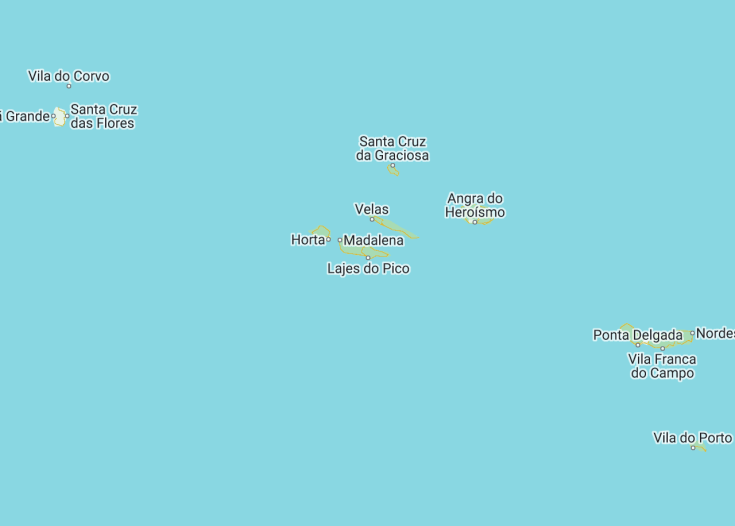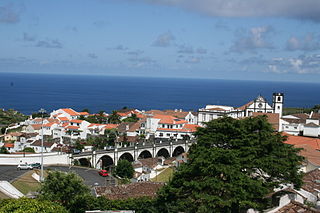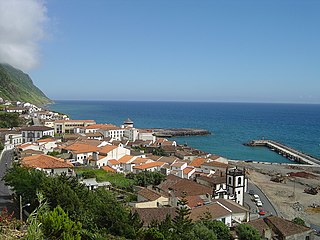The Azores is a stunning archipelago in the North Atlantic Ocean, known for its breathtaking landscapes and unique volcanic formations. With its lush greenery, pristine lakes, and rugged coastlines, the Azores offer a paradise for nature enthusiasts and adventure seekers. Visitors can explore the diverse marine life through snorkeling or diving, hike along the scenic trails, or simply relax and soak in the peaceful atmosphere. With its mild climate and warm hospitality, the Azores is a perfect destination for those seeking a tranquil escape from the hustle and bustle of everyday life.
Travel Tip: Don’t forget to bring a waterproof camera to capture the mesmerizing underwater world of the Azores.
Planning a Trip: Make sure to visit the Sete Cidades, a twin lake formed in the crater of a dormant volcano, to witness the captivating beauty of the Azores.
Top destinations in Azores (Portugal)
Azores: A Beautiful Archipelago in the Atlantic Ocean
| Capital | Ponta Delgada |
| Time in Azores | GMT -1 |
| Language spoken | Portuguese |
| Population | 245,000 (Source: National Institute of Statistics, Portugal, 2021) |
| Religion | Catholicism (95%) Other Christian denominations (3%) Others/Non-religious (2%) |
| Currency | Euro (€, EUR) |
| Airports | João Paulo II Airport (3 mi / 4.8 km from Ponta Delgada) Lajes Field (2 mi / 3.2 km from Praia da Vitória) Horta Airport (6 mi / 9.7 km from Horta city center) |
The Azores, an enchanting archipelago located in the middle of the Atlantic Ocean, is a destination that truly captivates the heart and soul of every traveler. With its breathtaking landscapes, rich history, and vibrant culture, the Azores offer a unique and unforgettable experience.
Where is Azores located?
The Azores is located approximately 1,500 kilometers off the coast of Portugal, in the North Atlantic Ocean.
What is Azores famous for?
The Azores is famous for its stunning natural beauty, including volcanic landscapes, majestic mountains, and pristine lakes. It is also renowned for its world-class whale watching opportunities, where visitors can witness the majestic creatures in their natural habitat.
History
The history of Azores can be traced back to its settlement by early explorers in the 15th century. This group of islands, located in the Atlantic Ocean, was discovered by the Portuguese during their age of exploration. The archipelago quickly became an important stopover point for ships traveling to and from the New World, serving as a strategic hub for commerce and navigation.
15th – 18th century
During the 15th and 16th centuries, Azores played a crucial role as a launching point for Portuguese expeditions to Africa, Asia, and the Americas. These islands provided fresh supplies and served as a base for the Portuguese explorers, including the famous navigator Vasco da Gama.
The 16th century also marked a period of settlement and colonization by the Portuguese. The islands saw an influx of settlers from mainland Portugal, bringing with them their language, culture, and traditions. The economy of the Azores began to develop around agriculture, particularly in the cultivation of wheat, maize, and sugarcane.
Throughout the 17th and 18th centuries, Azores faced challenges from foreign invasions and piracy. The Spanish, French, and English attempted to seize control of the islands, leading to conflicts and periods of instability. However, the Azoreans fiercely defended their territory and managed to maintain their autonomy.
19th – 20th century
The 19th century saw significant changes in the political and economic landscape of Azores. The islands became an important center for the whaling industry, attracting ships from Europe and North America. This industry brought wealth and prosperity to the islands, leading to the development of infrastructure and the growth of urban centers.
In the late 19th and early 20th centuries, Azores experienced waves of emigration as many Azoreans sought better opportunities abroad. Large numbers of Azoreans migrated to the United States, Canada, and Brazil in search of work and a better life.
Around this time, the islands also began to embrace tourism as a source of economic growth. The natural beauty, mild climate, and unique culture of Azores attracted visitors from Europe and beyond.
21st century
In the 21st century, Azores has continued to develop its tourism industry while preserving its natural and cultural heritage. The islands have become a popular destination for nature lovers, adventure seekers, and those looking for a tranquil getaway.
The local government has implemented initiatives to promote sustainable tourism and protect the environment. The Azores have been recognized as a UNESCO World Heritage site, further boosting their international reputation as a unique and pristine destination.
Visit Azores
What to see and do in Azores
Azores offers a variety of attractions and activities for visitors to enjoy. Here are some of the highlights:
- Explore the stunning natural landscapes, including volcanic mountains, crater lakes, and dramatic coastlines.
- Go hiking or biking in the lush green countryside, with many well-marked trails to choose from.
- Take a boat tour to discover the rich marine life and go whale watching, as the Azores are one of the best places in the world for this activity.
- Visit the historic towns and villages, with their charming architecture and cultural heritage.
- Taste the local cuisine, which features fresh seafood, cheese, and traditional dishes.
- Experience the unique cultural events and festivals that take place throughout the year, celebrating the Azorean traditions.
Events in Azores
Azores hosts a diverse range of events throughout the year, showcasing its vibrant culture and traditions. Some of the notable events include:
- Festas do Santo Cristo dos Milagres (May): One of the most important religious festivals in the Azores, celebrating the patron saint of Ponta Delgada with processions, music, and traditional dances.
- Festas Sanjoaninas (June): A lively festival in Angra do Heroísmo, featuring parades, concerts, bullfights, and street parties.
- Festival of the Holy Spirit (June – July): A series of religious and cultural events held across the islands, with processions, folk dances, and the distribution of “Sopas do Espírito Santo” (Holy Spirit soups).
- International Azores Trail Run (October): A challenging trail running event that attracts participants from around the world, showcasing the natural beauty of the islands.
Best time to visit Azores
The best time to visit Azores is during the spring and summer months, from April to September. The weather is mild and the landscape is at its most beautiful, with blooming flowers and lush greenery. This is also the peak season for outdoor activities, such as hiking, whale watching, and exploring the natural attractions.
However, it’s important to note that Azores has a maritime climate, which means that weather conditions can be unpredictable, and rain showers can occur throughout the year. It’s advisable to pack layers and be prepared for changing weather conditions.
Is Azores worth visiting?
Azores is definitely worth visiting for those seeking a unique and natural destination. The islands offer breathtaking landscapes, rich biodiversity, and a peaceful atmosphere that is hard to find elsewhere. The hospitality of the Azorean people, combined with their vibrant culture and delicious cuisine, make for a memorable experience.
However, it’s important to keep in mind that Azores is more suitable for those who appreciate nature and outdoor activities. If you’re looking for a bustling city with a vibrant nightlife, Azores may not be the best choice. Additionally, due to its location in the Atlantic Ocean, getting to Azores may require a longer journey compared to other destinations.
Overall, if you’re a nature lover and enjoy exploring off-the-beaten-path destinations, Azores is definitely worth considering for your next trip. Its unique beauty and tranquil atmosphere will leave you with unforgettable memories.














